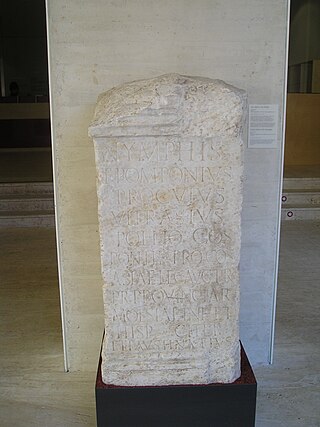Related Research Articles

Titus Pomponius Proculus Vitrasius Pollio was a Roman senator, who held several imperial appointments during the reign of Marcus Aurelius. He was suffect consul in an undetermined nundinium around 151; he was a consul ordinarius in the year 176 with Marcus Flavius Aper as his colleague.
Titus Statilius Maximus was a Roman senator of the 2nd century AD. He was consul in the year 144 as the colleague of Lucius Hedius Rufus Lollianus Avitus. He is known entirely from inscriptions.
Servius Cornelius Scipio Salvidienus Orfitus was the name of several Roman men who lived during the early Roman Empire. They were descendants of Orfitus who was adopted by Servius Cornelius Scipio, an otherwise unknown member of the patrician branch of the Cornelii Scipiones.
Lucius Hedius Rufus Lollianus Avitus was a Roman senator and military officer. He was consul in the year 144 as the colleague of Titus Statilius Maximus.
Lucius Aemilius Carus was a Roman military officer and senator who served as consul suffectus for one of the nundinia in the first half of AD 144, with Quintus Egrilius Plarianus as his colleague. His life is known primarily through inscriptions.
Marcus Vettulenus Civica Barbarus was a Roman senator of the second century AD. A member of the Patrician class, he held the office of consul ordinarius in 157 with another patrician, Marcus Metilius Aquillius Regulus, as his colleague. Barbarus was also a member of the sodales Antoniniani, a religious fraternity which attended to the cult of the emperor Antoninus Pius.
Publius Mummius Sisenna Rutilianus was a Roman senator of the second century AD. He is best known from Lucian's vivid portrayal of him in Alexander vel Pseudomantis, where the senator is described as "a man of good family and tested in many Roman offices, but utterly sick as far as the gods were concerned," as the most distinguished victim of the bogus oracle established by the story's namesake in Paphlagonia. Rutilianus was suffect consul in the nundinium of May-June 146 with Titus Prifernius Paetus Rosianus Geminus as his colleague.
Lucius Dasumius Tullius Tuscus was a Roman senator who was an amici or trusted advisor of the emperors Antoninus Pius and Marcus Aurelius. He was suffect consul in the nundinium of April to June 152 AD as the colleague of Publius Sufenas.
Lucius Novius Crispinus Martialis Saturninus was a Roman senator of the second century. He was suffect consul in either 150 or 151 AD. His life is primarily known from inscriptions.
Marcus Pontius Laelianus Larcius Sabinus was a Roman senator and general who held a series of offices in the emperor's service. He was suffect consul for the nundinium of July-August 145 as the colleague of Quintus Mustius Priscus. Laelianus is primarily known through inscriptions.
Quintus Fuficius Cornutus was a Roman senator active in the first half of the second century AD, who held a number of offices in the emperor's service. He was suffect consul for the nundinium April-June AD 147 with Aulus Claudius Charax as his colleague. Cornutus is known only from inscriptions.
Quintus Camurius Numisius Junior was a Roman senator active during the later second century AD. He was suffect consul for a nundinium in the first half of the year 161 as the colleague of Marcus Annius Libo.
The gens Salvidiena was a plebeian family at ancient Rome. Members of this gens are first mentioned toward the end of the Republic, and from then to the end of the second century they regularly filled the highest offices of the Roman state.
Quintus Cornelius Proculus was a Roman senator, who was active during the middle of the second century AD. He was suffect consul in the nundinium of November–December 146 as the colleague of Lucius Aemilius Longus. Proculus is known entirely from inscriptions.
Gaius Prastina Messalinus was a Roman senator, active during the reign of Antoninus Pius. He was consul in the year 147 with Lucius Annius Largus as his colleague. Messalinus is known entirely from inscriptions.
Lucius Sergius Paullus was a Roman senator, who was active during the reign of Marcus Aurelius. He was twice consul: the first time attested 23 September of an unknown year as suffect consul with [? Lucius Nonius Calpurnius] Torquatus Asprenas as his colleague; and as consul ordinarius for 168 as the colleague of Lucius Venuleius Apronianus Octavius Priscus.
Quintus Caecilius Marcellus Dentilianus was a Roman senator, who held several imperial appointments during the reign of Antoninus Pius. He was suffect consul in an undetermined nundinium around AD 150. He is known entirely from inscriptions.
Publius Cluvius Maximus Paullinus was a Roman senator, who held a number of imperial appointments during the reigns of Hadrian and Antoninus Pius. He was suffect consul during an undetermined nundinium between 139 and 143. He is known entirely from inscriptions.
Marcus Cominius Secundus was a Roman senator, who was active during the reign of Marcus Aurelius. He was suffect consul in one of the later nundinia of 151 with Lucius Attidius Cornelianus as his colleague. He is known from inscriptions and military diplomas issued during his time.
References
- ↑ Werner Eck, G. Paci, and E. P. Serenelli, "Per una nuova edizione dei Fasti Potentini," Picus, 23 (2003), pp. 51-108)
- ↑ Olli Salomies, Adoptive and polyonymous nomenclature in the Roman Empire, (Helsinki: Societas Scientiarum Fennica, 1992), p. 52 n. 76
- ↑ Géza Alföldy, Konsulat und Senatorenstand unter der Antoninen (Bonn: Rudolf Habelt Verlag, 1977), p. 304
- ↑ Alföldy, Konsulat und Senatorenstand, p. 323
- ↑ Eck, "Jahres- und Provinzialfasten der senatorischen Statthalter von 69/70 bis 138/139", Chiron , 13 (1983), pp. 165f